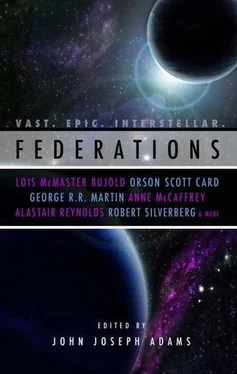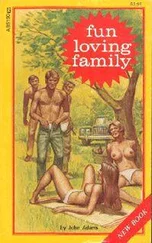“I trade with lots of people; what I wanted was sizzle ! Instead, I got a lecture about non-essential frivolities.” The Union turned in the general direction of Bloc territory and shouted, “Some of us think music is essential!”
[In response to the Bloc’s lack of art, the citizens of the Union embarked on a frenzy of creative output, much of it posing as pity for those soulless creatures with no sense of aesthetics. Meanwhile, the Bloc began a century of trying to comprehend what the Union had been talking about. A tentative R&D effort managed to produce macramé, but when that threatened to lead to mixed-media sculpture, the project was dismantled and the ground sown with salt.]
• • •
The Union told Didge, “Why didn’t you ask if she liked art?”
“Oh,” Didge replied, “I must have missed that in your requirements. MUST HAVE AN APPRECIATION OF ART. No, sorry, I don’t have that written down.”
“When you were generating translation software, the absence of words for art and music didn’t strike you as significant?”
“You don’t have a word for frelzy , but the Bloc didn’t mind.”
The Union asked, “What’s frelzy ?”
“The ability to set a sensible bedtime and to follow through on your decision.”
The Union stared blankly.
• • •
“Is there someone on the list who does practice art?” the Union asked.
Didge said, “Perhaps you’d like the Nebular Commune. They occupy several nebulas around the galaxy, but not the areas in between. The Commune only inhabits regions with heightened visual appeal.”
“What about music and dance?”
“The Commune practices them in abundance. Also many types of narrative entertainment, tactile and olfactory media, pyrofantasias…”
“Pyrofantasias?”
“Making things explode in pretty colors.”
“My kind of girl,” the Union said. “What’s wrong with her?”
“Why do you keep asking that?”
“If a civilization is attractive, there must be a reason why she isn’t already attached. This galaxy is full of federations on the prowl—the Silicon Syndicate, the Cybertheologic Collective, Emancipation of the Flesh™—and they’ve all got the moves to snap up whoever they want. If they leave someone alone, I want to know why.”
Didge said, “The Commune fits all your dating criteria. She’s lively, she’s organic, she owns valuable real estate…”
“All right, all right, give her a call.”
The process went smoothly, due to new technology obtained from the Bloc. (Sometimes you can learn from a failed relationship.) The Union’s communication grid now reached farther; its scout-ships flew faster. Didge breached the Commune’s language barrier in only five years. In another four, she’d arranged a cozy get-together.
First contact took place in a small nebula (naturally), on a hot rocky planet orbiting a blue-white star. The world had no permanent population, but the Union couldn’t help noticing a complex of thermoproofed buildings several centuries old. “Hey, Didge,” the Union whispered over a long-range communicator. “Did the Commune once have a colony here?”
“No,” Didge answered. “But I believe the Commune has employed the planet for previous meetings with foreign delegations.”
“What? How many other federations has she brought here?”
“The Silicon Syndicate, the Cybertheologic Collective, Emancipation of the—”
“Didge!”
At that moment, the Commune’s diplomats appeared. They belonged to a dozen species, but all were dressed in diaphanous robes of vivid colors. “Greetings, greetings, greetings!” they sang in complex polyphonic harmonies.
“Hi,” said the Union. Its delegation wore business suits.
“Let us retire to the rooms of delight,” the Commune’s diplomats sang.
“Could we talk a little first?” the Union asked.
“About what?”
“We’d just like to get to know you. For instance, what are your laws on intellectual property?”
The Commune stared blankly.
“Okay, look,” the Union said, “intellectual property laws provide clear title of ownership over ideas or information, so that those who originate new concepts or designs can—”
“Have you ever stuck a wire into the pleasure center of your brain?” the Commune interrupted.
“Um…”
“And another wire into the pain center. Then you give the controls to a total stranger, never knowing which button he’ll press.”
The Union delegation cleared its collective throat. “Um, no, we’ve never done that.”
The Commune’s chief diplomat tossed over a black box with a red button and a green one. “You go first.”
The Union asked, “Which button’s which?”
The Commune laughed. “Does it matter?”
The Union set the black box down. “Mayyyy-be later.”
The Commune shrugged. “Have you ever planted a device in a blue-white sun that will make it go nova if new acquaintances don’t stop acting like total prudes?”
“Aww, jeez…” Reluctantly, the Union picked up the black box.
• • •
“Next time,” the Union told Didge, “we are not broadcasting the First Contact ceremonies live.”
Throughout Union territory, the frenzy of creative output had come to an abrupt halt. The public’s mood had veered sharply toward comfort food and muted conversations on darkened verandas. Grown-up children called their parents without being asked. Teens sat alone in their rooms and obsessed over wiring diagrams.
“On the bright side,” Didge said, “the Commune is eager to buy your mixed-media sculpture.”
The Union shuddered.
• • •
A decade passed before the Union was ready to get on the horse again (so to speak). During that time, the Zeitgeist fluctuated through rises and falls—elation at the publication of a new math proof, agony when a detractor pointed out it tacitly assumed the axiom of choice—but underneath, nothing had changed in the Union’s situation. Individual lives went through happiness, sorrow, triumph, tragedy, but as a whole—as a whole—the Union felt like it was strangling.
It wasn’t enough for itself; its relationships with other interstellar entities were merely utilitarian; it had no one who made it feel special. Didge did her best to keep the Union from moping, inventing games and new consumer goods that everyone had to buy two of. But in time, the Union [which is to say, its trendsetters, then its masses, and lastly its leaders] came to realize it still needed companionship. A soulmate. A wife.
“Didge,” the Union said, “did the list have anyone who wasn’t hopeless?”
“You could at least talk to one of the utopias.”
The Union made a face. “I don’t want someone with a nice personality; I want someone good .”
“You want someone better than you deserve?”
“I’m biological. Of course I want someone better than I deserve.”
Didge fell silent for several hours. The Union wondered what she was thinking. Then Didge said, “I guess you could try the Inner Worlds Abundance.”
“Who’s she?”
“A plutocracy occupying several hundred star systems near the galactic core. No claims to being a utopia, but generally benevolent—even to the poor, as long as they know their place. My friends say the Abundance produces first-rate art, but she isn’t too, um, frisky.”
The Union sighed. “So what’s wrong with her?”
“Oh, nothing,” Didge said. “She’s perfectly gracious. Charming. She’s even pretty, in a packaged way.”
Читать дальше












